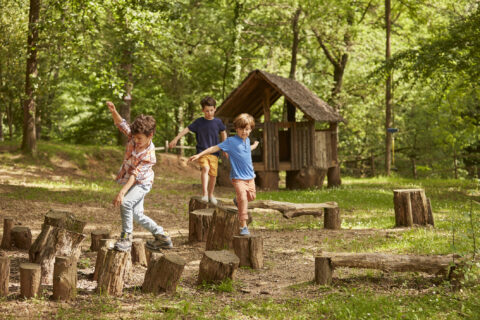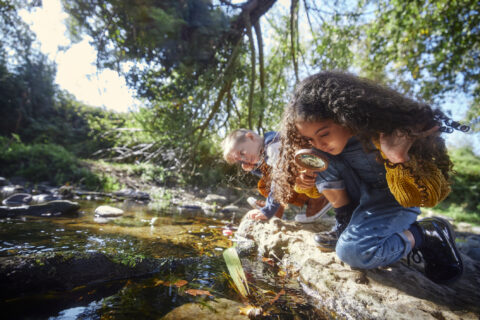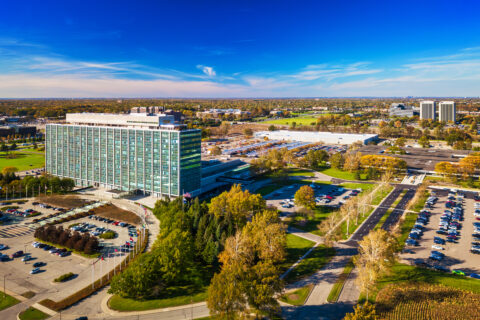Imagine a neighborhood where young children and caregivers can explore nature-rich environments with plenty of shade, trees and flowers. A community where early childhood centers offer outdoor play and learning spaces filled with trees, pollinator gardens and natural play elements. Educators confidently lead nature-based activities, fostering a connection to the environment that benefits children’s development and nurtures future environmental stewards.
Regular exposure to nature in early childhood boosts physical and mental health, supports social-emotional development, enhances school readiness and instills pro-environmental attitudes. Recognizing these benefits, community leaders are prioritizing efforts to connect young children with nature while also addressing the growing threat of environmental hazards such as climate change. Cities are designing climate-resilient outdoor spaces and incorporating nature-based programming to mitigate urban heat, enhance biodiversity and strengthen community resilience.
The National League of Cities (NLC) is supporting these city-driven efforts through two key initiatives:
1. Nature Everywhere Communities
In partnership with the Children & Nature Network and KABOOM!, the Nature Everywhere Communities initiative addresses the intersections of nature equity, play equity and climate resilience by advancing equitable access to nature where children live, learn and play. Participating communities are aligning policies, engaging cross-sector leadership and developing action plans to expand young children’s access to nature.
2. Outdoor and Nature-Based Early Care and Education Collaborative
Launched in late 2024, the Outdoor and Nature-Based Early Care and Education Collaborative brings together policymakers, early childhood providers and advocates to promote nature-based early childhood education and drive local, state and federal policy change.
Landscape Scans
As part of the Nature Everywhere Communities initiative, city teams are conducting landscape scans — a comprehensive review of local policies, stakeholders, assets and opportunities. This process helps cities identify gaps, leverage existing resources and build on previous successes rather than starting from scratch. Several cities are already making significant progress:
Pima County, AZ
The Pima County Children and Nature team aligned with the City of Tucson’s Office of Equity to develop the Children’s Equity Nature Index, identifying areas where children under five face the greatest barriers to outdoor access. They are now integrating nature exploration areas, featuring local materials and natural elements, into community spaces. The features include plenty of shade to address local climate considerations like excessive heat.
Dubuque, IA
Dubuque is tying early childhood nature connection efforts to its Climate Action Plan, which aims to expand the city’s tree canopy and mitigate urban heat. The city is collaborating with the Executive Director of Wanderwood Gardens, a 2.5-acre children’s garden opening in 2026, and the Dubuque Community School District to integrate nature elements into preschool programs.
Emeryville, CA
In Emeryville, CA, Emeryville Children and Nature is building partnerships with the city, school district, and community organizations to create and activate more inclusive outdoor spaces. The city operates the Emeryville Child Development Center and the Emeryville Center of Community Life includes a K-8 campus with community and family services, arts and recreation. The team is aligning their plans to multiple city plans and programs, including the Capital Improvement Program, Climate Action Plan, Green Infrastructure Plan and Urban Tree Planting Program.
Louisville, KY
In Louisville, KY, the Louisville Nature Everywhere team includes partners from Wilderness Louisville, Play Cousins Collective and the Natural Areas Division of Louisville Metro Parks, all working to advance play equity and improve accessibility. The team believes that policies promoting equitable access to outdoor spaces for youth will continue to empower them, not only as the next generation of environmental stewards. In an effort to increase nature access, the team is aligning efforts with the Mayor’s Thrive by 5 Universal Pre-K Initiative to integrate nature experiences into early childhood education.
Tri-County Play Collaborative, SC
This South Carolina partnership of 16 organizations is planning to embed nature play features and programs in high-need areas of Charleston, including housing communities. They are adding Math Talk trails to anchor sites across three counties, fostering playful math learning while creating safe, nature-rich play spaces. Each site will address areas of concern like shade, air quality and flood mitigation.
Successes like these hinge on engaging cross-sector partners and aligning efforts with local climate and equity plans. Collaborative efforts like those in Pima County, Dubuque, Emeryville, Louisville and the Tri-County Play Collaborative demonstrate the power of partnership in transforming early childhood outdoor environments. These initiatives are not only improving children’s well-being but also contributing to climate resilience and sustainability.
As communities across the nation strengthen their commitment to nature access for all children, they are fostering a future where all children can grow, play and thrive — while ensuring a more resilient planet for generations to come.
More to Explore
Cities interested in exploring ways to integrate nature-based solutions for early childhood and climate resilience should explore the following resources:
- Early Childhood Nature Connections Toolkit, created by Cities Connecting Children to Nature, a national initiative of NLC and Children & Nature Network (C&NN), provides resources, including case studies, for cities to connect young children to nature with an equity lens.
- Bridging the Fields of Children to Nature and Resilience, created by NLC, C&NN and The Regional Plan Association, highlights examples of ways to achieve city climate resilience and sustainability goals while also providing ways for children to connect to nature.
- Intersection of Early Childhood & Environmental Impacts Playbook, released by NLC and Healthy Babies Bright Futures, highlights on-the-ground programs in Bright Cities across the country that benefit both children’s health — including their neurodevelopment — and environmental health.
NLCU: Nature Everywhere Challenge
Register for the free NLC University course to place your city in the forefront of efforts to connect children to nature more equitably and learn how to receive nationwide recognition for doing so. Along with faculty and tools and resources drawn from NLC, Children & Nature Network and KABOOM!, course participants from your city will learn how to reduce “nature deficit disorder” and realize the promise of “more green, less screen.”










